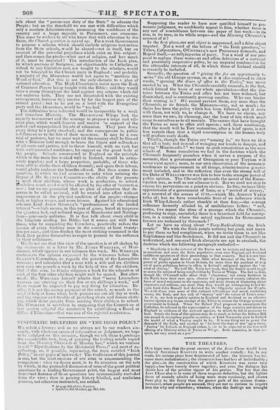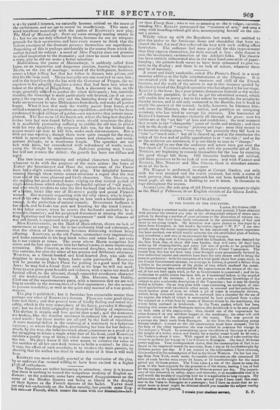THE THEATRES.
Ora hope ma, that the great success of the Love Chase would have induced SHERIDAN! KNOWLES to write another comedy : for, to say truth, his serious plays have deteriorated of late : the interest has be- come more melodramatic ; the characters have had less of individuality ; the plot—in the construction of which KNOWLES was never eely happy—has been loosely drawn together; and even the dialogue has shown less of the pristine vigour of his genius. Not but that the Love Chase also is in some of these respects defective, but the lighter dress of comedy admits of being worn more carelessly, and allows freer play to the fancy than the graver garb of the serious drama: moreover, when people are amused, they are not so curious to inquire into the why and wherefore; whereas, when the feelings are wrought U. 0:1 by painful interest, we naturally become critical on the cause of the excitement, and are apt to resent its insufficiency. This state of mind interferes materially with the pathos of KNOWLES'S new play, The Maid of Mariendorpt : there are some strongly moving scenes in It ; hut we are not duly affected by them, because we see no adequate grounds for their occurrence, and have every reason to think that the violent emotions of the dramatis persome themselves are superfluous. Something of this is perhaps attributable to the source from which the
author derived his subject : a novel of Miss PORTER does not promise to afford inspiration to the dramatist ; and since he must needs borrow a story, pity he did not make a better selection. Aliffiledenau, the pastor of Alariendorpt, is suddenly called from
home, on an imperative and dangerous mission, leaving his daughter, Meets, on the eve of marriage : instead of the bridegroom, however, comes a latter telling her that her father is thrown into prison, add that his life -Nato peril. Meeta instantly sets out resolved to save him ; and in the ititerViewthat she has with the Governor of Prague, she re- cognizes in his adopt) daughter a sister that had been lost when tin infant at the strii of .lagdeburg. Such a discovery as this, on the stage, generally s ee to pardon the vilest delinquent ; but, notwith- standing the Gover r is made particularly soft-hearted, (as if on pur- pose,) the capture o the city und the battering down of the prison. wallsare necessary to save Aliffiledenan from death, and make all parties happy. What It was that took the worthy pastor from home, at so critical a mome ' t, and on so perilous an expedition—and why he has beet) condemned bey nd all hope of pardon—are mysteries that remain unex- plained. The l ist scene of the fourth act, where the long-lost daughter rushes into lie • new-found father's arms, should terminate the play;
it is ncedleslj protracting suffering to exhibit the old man in pi-1mm with his two fipughters; the suspense fails too, for the boldest dra- matist would n4et dare to kill him, under such circumstances. But a fifth act was w nting ; though three were quite enough for the story, which is spun out by superfluous scenes and characters, and unim- portant diadog e, to a wearisome length. The speeches are not rich with de s, but encumbered with redundancy of words, weak- ening the 'thought by reiteration. Judicious pruning may lessen, but will not remove the defect : the growth has been too diffuse and The two most entertaining and original characters have nothing whatever to do with the progress of the main action : the loves of Esther the housekeeper and Hans the servant-man of the Pastor have biii a slight connexion with the play. The delightful humour t timid': ;through these comic scenes occasions a regret that the rest were n of the same pleasant and lively character. Airs. GLoven, as the scqlding but good. natured dame, verging on that critical period of single-blessedness which challenges the hateful epithet of "old maid," and wfio wisely resolves to take the first husband that offers in default of a tter, looks like one of llreess's portly and genial Flemish wome . tier matronly coquetting with the silly clown, who is fright.
Me
ened t his n boldness in venturing to love such a formidable per- sonag , is the perfection of natural comedy. BUCKSTONE buffoons it too II ich, and he looks too pert and knowing for the timid Cymon : in th latter scenes, when he asserts the husband's authority, he is more be character ; and his perplexed discontent at missing the wed- ding l4tivities and the sweets of " honeymoon " amid the chances of war and travel, is expressed with great gusto. Miss ELPHINSTONE, as the Alaid of :41ariendorpt, shows no lack of earnestness or energy ; but she is too uniformly loud and vehement, so that the climax of her emotion becomes distressing without being affecting. KNOWLES, as the old Pastor, sermonizes very impressively, and looks venerable in his long black robes and white hair ; yet even he is too violent at times. The scene where Meeta recognizes her sister, and the lost one rushes into her father's arms, is mere inarticulate screaming. Miss COOPER, as the recovered daughter, not only avoids this extreme, but also the other of too precise and deliberate utterance. Weesrea, as a liberal-handed and kind-hearted Jew, who aids the daughter in rescuing her father, looks quite patriarchal. KNOWLES will be popular in Duke's Place for putting in a good word for the Jews : he may find a friend there such as we hope he will not need. STRICKLAND gives great breadth and richness, with a spice too much of farcical effect, to the pleasant, though somewhat overdrawn character of the tender-souled Governor. A Mrs. DANSON, from Dublin, filled one of the supernumerary parts, with a tameness that we are wil- ling to ascribe to the nervousness of a first appearance ; for she seemed to possess sensibility, as well as the quiet easy manner of a true gentle- woman.
The play is published ; but it furnishes less extractable matter than perhaps any other of KNOWLES'S dramas. There are some good things here and there; and that general tone of kindly feeling and sound mo- rality, which is the very atmosphere of his fancy, pervades it through- out; but we find little originality of thought or felicity of expression. The diction is simple, and less quaint than usual ; and the sentences are broken, like the foniliar utterance in ordinary life of unpremedi- tated words : but these merits are alloyed by the fault of repetition. A more material defect is the straining of a sentiment to a ludicrous extreme ; as where the daughter, proclaiming her love for her father— which, by the way, she talks too much about—instances as a proof of it her struggling to retain u single white hair of his head, (and KNowLes exhibits a goodly crop of them,) which some one was going to put in the fire. We don't know if this were meant to euliance the value of the sacrifice of all her own dark tresses to bribe a sentinel: be this as It may, the effect of such overdoing is to weaken the main passion, by showing that the author has tried to make more of it than it will well bear.
KNOWLES Was most cordially greeted at the conclusion of the play, by an audience that seemed willing to have been excited to a higher pitch of enthusiasm.



























 Previous page
Previous page